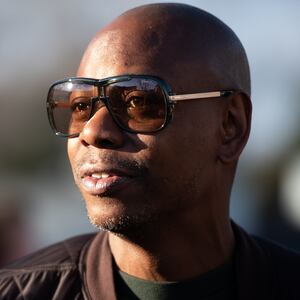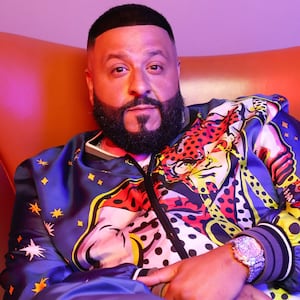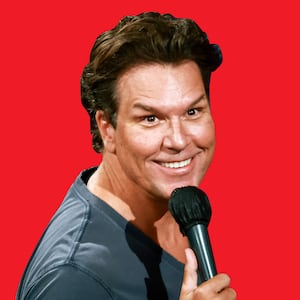In the early hours of Tuesday morning, Dave Chappelle dropped The Closer, his ninth standup special overall (and sixth for Netflix). The hour-long set was recorded at The Fillmore in Detroit in August of this year.
“Everyone have a seat, be comfortable, relax. I gotta tell ya… let’s go, let’s go,” Chappelle, sporting a perfectly manicured suit and white sneakers, tells the raucous crowd at the start.
The 48-year-old comedy legend then adds, “I need you guys to know something, and I’m gonna tell you the truth, and don’t get freaked out: This is going to be my last special for a minute,” later explaining that The Closer will complete his “body of work” for the streaming giant.
Once the applause dies down, Chappelle dives in, tackling the COVID-19 epidemic and his own battle with the deadly virus after he contracted it back in January.
“I don’t want you to worry about me. I’m vaccinated. I got the Johnson & Johnson vaccine. I gotta admit, that’s probably the most n-----ish decision I’ve made in a long time. I walked in the doc like, ‘Give me the third best option! I’ll have what the homeless people are havin’!’ So far so good!”
“I don’t know if you heard on the news: I did get coronavirus—and it was something else,” he continues. “I felt dirty. I felt gross. Because I had been walking around Texas just touching doorknobs and shit, hands all moist, tipping n----s with cash. Here, take this to your family. I must have killed thousands of people just trying to get tonight’s show together, so I hope you appreciate it.”
Chappelle further admits that he “didn’t get sick at all” from contracting COVID, calling himself “the Magic Johnson of coronavirus,” but that he did get stressed out by watching so many videos of Black people beating up Asians on the streets during the pandemic—before cracking, “I couldn’t help but feel like, when I saw these brothers beating these Asians up, that’s probably what’s happening inside of my body.”
Over the course of The Closer, which was directed by Emmy-winner Stan Lathan, who’s shot all of Chappelle’s Netflix specials, the comic weighs in on issues of racism, discrimination, sexuality, and gender identity, often finding himself pitting the struggle for Black liberation against the LGBTQ and feminist movements, as he’s done repeatedly in the past.
Addressing “the LBGTQ [sic] community directly,” Chappelle says that he comes in peace while wishing to “negotiate the release of DaBaby”—the chart-topping rapper who made some homophobic comments during his set at Miami’s Rolling Loud festival back in July—before expressing how jealous he is of the progress that the LGBTQ community has made compared to Black people, and recounting the time a gay white man called the police on him in Austin after Chappelle confronted the man about filming him and his wife in bar.
He then clumsily segues into a troubling story about a supposed incident in which he says he beat up a butch lesbian woman for throwing a punch at him (the woman later, he claims, tried to sell the story to TMZ): “I’m glad TMZ didn’t believe that—because I did beat the shit out of her. I’m not gonna lie. It was her fault. I had no choice.”
There’s more, of course, including Chappelle weighing in on the “annoying as fuck” (his words) ways Hollywood’s white women have handled the #MeToo movement, arguing the onus was somehow on Weinstein’s A-list victims to hire underlings as agents in order to protect everyone from his abuse, and how the transgender community “want me dead” for his habit of performing transphobic jokes, offering up as evidence a few times angry transgender people or allies have gotten in his face over said jokes.
“Any of you who have ever watched me know that I have never had a problem with transgender people. If you listen to what I’m saying, clearly, my problem has always been with white people,” he maintains.
Chappelle then tries to convince the audience—in the crowd and at home—that he’s never made any explicitly anti-transgender jokes, requesting that the audience “go back” and revisit his specials. (He most certainly has, and you can read the great trans writer Samantha Allen on it here.) He defends J.K. Rowling against being “canceled” over her transphobic remarks (which he deeply misrepresents), before saying, “I’m team TERF!”—the term for trans-exclusionary radical feminist, or feminists who are transphobic and do not believe trans women are women.
“Gender is a fact,” he reasons. “Every human being in this room, every human being on earth, had to pass through the legs of a woman to be on earth. That is a fact. Now, I am not saying that to say trans women aren’t women, I am just saying that those pussies that they got… you know what I mean? I’m not saying it’s not pussy, but it’s Beyond Pussy or Impossible Pussy. It tastes like pussy, but that’s not quite what it is, is it? That’s not blood. That’s beet juice.” (Chappelle’s anti-trans jokes have often boiled down to human anatomy, which shows how unnuanced his views are on the subject.)
He later tries to qualify this material by telling a story about Daphne Dorman, a white transgender woman who loved his trans jokes and whom Chappelle befriended before she took her own life in October 2019, shortly after he’d given her a shoutout in his Netflix special Sticks & Stones. Chappelle reveals that he’s started a trust fund to pay for Daphne’s daughter’s college education, and that he won’t be doing any more LGBTQ jokes “until we are both sure that we are laughing together. I’m telling you, it’s done. I’m done talking about it. All I ask of your community, with all humility: Will you please stop punching down on my people.”
Here, Chappelle is referring to the Black men he’s previously cited in The Closer—DaBaby, Kevin Hart, and himself—who have been, in his eyes, victimized (translation: missed out on some job opportunities, while remaining very rich and popular) by the LGBTQ community for telling transphobic and homophobic jokes, or making homophobic comments, and initially refusing to apologize for them.
With that, he tossed the mic, drank in the applause, and walked offstage.









